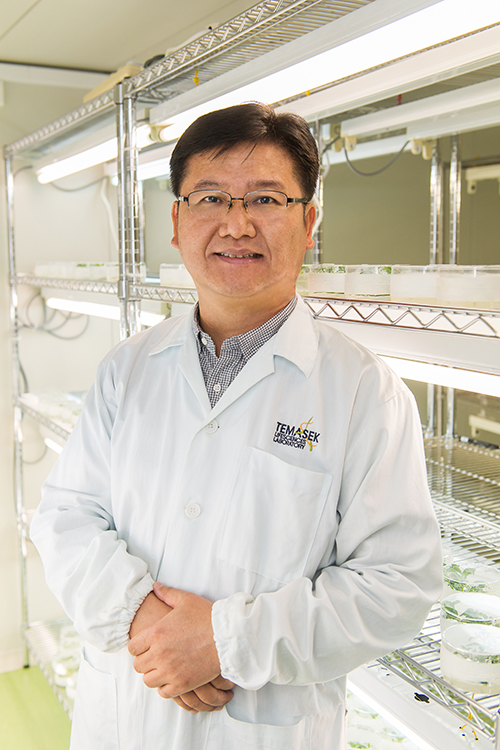
Impact
As sessile and photo-autotrophic organisms, plants dynamically respond to changes in light and other environmental factors for adaptation and growth. For example, shade conditions caused by surrounding vegetation or high density planting trigger shade avoidance syndrome, while high ambient temperature triggers thermomorphogenesis. These plant responses are detrimental for crop yield and quality, including increasing susceptibility to diseases and accelerating aging and plant senescence. By developing crops with bettertolerance to such stresses, urban farms can maximize crop yield while reducing energy use. Coupled with better plant health monitoring systems, urban farms can avoid experiencing great losses in commercial farm production.
Collaborations, Achievements & Honours
- Developed auxin nano sensors that detect light and temperature stresses, IAA (indole-3-acetic acid) and IPA (indole-3-pyruvic acid) in plants
- Identified Raman optical biomarkers for early diagnosis of shade avoidance syndrome in plants
- Patented Raman optical biomarker for shade avoidance syndrome in plants
- Generated Stevia plants with improved quality of steviol glycosides
- Patented the overexpression of SrUGT76G1 in Stevia, which alters major steviol glycosides composition for improved quality
- Patented terpene synthases from Ylang Ylang
- Collaborated with MIT on Disruptive and Sustainable Technologies for Agricultural Precision (DiSTAP)
- Collaborated with Korea Research Institute of Bioscience and Biotechnology on synthetic biology
- Granted research on Enabling improved and efficient growing conditions in urban farms by R&D Program under Asian Institute of Modern Agronomy (2024)
- Granted research on Disruptive and Sustainable Technologies for Agricultural Precision 2 (DiSTAP2) in the Singapore-MIT Alliance for Research and Technology (SMART) Centre by National Research Foundation (2023)
- Granted research on High Performance Precision Agriculture (HiPPA) by A*STAR (2020)
- Granted research on Disruptive and Sustainable Technologies for Agricultural Precision (DiSTAP) in the Singapore-MIT Alliance for Research and Technology (SMART) Centre by National Research Foundation (2018)
- Granted research on Synthetic cannabinoid biology for nature-based therapeutics in the Synthetic Biology R&D Programme by National Research Foundation (2017)
- Granted research on Green factories for essential oil production – Develop plant and microbial systems for sustainable production of valuable chemicals from plants by National Research Foundation (2012)
- Awarded a fellowship by the Human Frontier Science Programme (2004)
- Research Areas: Plant Molecular Biology, Synthetic Biology, Genetics & Genomics
Research Areas
Plant Molecular Biology, Genetics & Genomics, Plant Response to Environment, Crop Biotechnology, Light and Phytohormone Signaling
Affiliations
- Senior Principal Investigator, TLL
- Adjunct Assistant Professor, Department of Biological Sciences, NUS
Question
How do mechanisms underlying shade avoidance response enhance the production of leafy vegetables and crops in high density farms?
Approach
In-Cheol hopes to better monitor plant health for improved crop yield, and make crops tolerant to abiotic stresses for high density urban farming.
As sessile and photo-autotrophic organisms, plants use light as an environmental cue to provide positional information to adjust and adapt their physiological responses. In particular, In-Cheol’s lab is actively researching how plants dynamically respond to changes in light, temperature and other environmental factors for adaptation and growth.
In high density urban farms, shade avoidance syndrome and thermomorphogenesis cause stem and petiole elongation, early flowering, reduced leaf development, and early senescence. As these responses result in loss of crop yield, In-Cheol’s lab researches the complex mechanism underlying these responses, including transcriptome and metabolome changes under various stresses and the roles of phytohormones in regulating plant responses. The research outputs are aimed at improving precision agriculture for the future.
Additionally, by identifying genes that respond highly to shade and high temperature stress, the lab aims to generate vegetable varieties that are tolerant to light and temperature stresses by genome editing. Optical biomarkers and nanosensors have been developed for early detection of light and high temperature stress, which are especially applicable in urban farms. Looking ahead, In-Cheol aims to apply auxin nanosensors to plant stresses and develop light recipes and shade-tolerant leafy vegetables for urban farms.
In-Cheol’s lab also integrates metabolome and transcriptome analysis of aromatic plants and flowers to unravel biosynthetic pathways for producing high-value plant volatile organic compounds composed of terpenoids and other secondary metabolites. To date, discoveries include the production of multiple terpenes of different chain length by subcellular targeting of multi-substrate TPS in plants; the biosynthesis of dominant floral scent compound 2-phenylethanol in Plumeria rubra; and co-expression of peppermint GPP subunit for monoterpene production in transgenic tobacco plants.
Bio
In-Cheol read his PhD in Plant Molecular Biology, Biochemistry and Biotechnology at Myongji University. After completing postdoctoral training with Chua Nam Hai at Rockefeller University, he joined as a research associate to unravel mechanisms regulating light signalling in Arabidopsis. In-Cheol wasawarded a fellowship by the Human Frontier Science Programme in 2004. He joined TLL in 2012. In-Cheol is currently Senior Principal Investigator at TLL and Adjunct Assistant Professor at NUS.
Senior Principal Investigator
Jang In-Cheol
The lab studies plant molecular biology and mechanisms in response to light and other environmental factors to develop techniques and varieties for better crop production in high density urban farms.
Current Vacancies
Group Publications
-
A Near Infrared Fluorescent Nanosensor for Spatial and Dynamic Measurements of Auxin, Indole-3-Acetic Acid, in Planta
Khong DH#, Vu KV#, Sng BJR#, Choi IKY, Porter TK, Gong X, Nguyen NH, Ang M, Park M, Lew TTS, Loh SI, Ahsim R, Chin HJ, Singh GP, Chan-Park MB, Chua NH, Strano MS*, Jang IC*.24 May 2024
